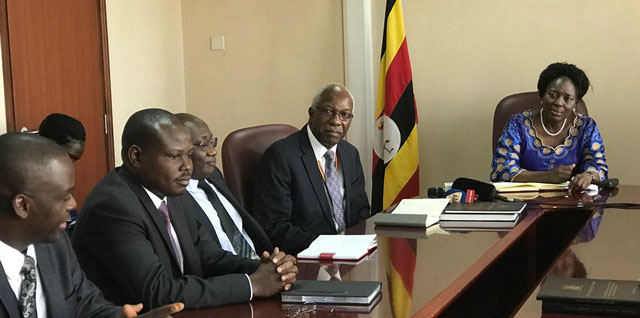
Auditor General Presents 2016/17 Audit Report to Parliament
Kampala, Uganda | THE INDEPENDENT | A worrying trend of financial indiscipline in some government departments resulting in massive corruption, excessive and unaccounted-for spending are the hallmarks of an audit report by the Auditor General.
The report presented to the Speaker of Parliament Rebecca Kadaga on Friday by the Auditor General John Muwanga shows misappropriation of monies in government entities and poor service delivery by some ministries and departments.
According to the damning audit report for financial year 2016/17, Uganda lost about $16.95 million, an equivalent of sh 58 billion in undeclared royalties in the exportation and importation of gold in the year 2016/2017.
The auditi indicates that the Directorate of Geological Surveys and Mines issued gold export permits for only 16.281 kilograms, yet records from Uganda Revenue Authority, indicated that 8,691 kilograms of gold, valued at $339 million were exported from Uganda in the financial year 2016/17
It also indicated that the gold exports permits for an exporter were supported by export permits from the Ministry of Tourism, Trade and Industry as opposed to being issued by the ministry of energy and mineral development which was contrary to the Mining Act, 2003.
The report further noted that there was equally no evidence of payment of royalties on the exported gold implying that, during the financial year, the country lost revenue approximated at 16.95 million dollars in royalties from the undeclared gold exports and imports.
The Auditor General has advised that this matter be investigated with a view to recover the prescribed royalties.
Mining sector anomalies
Still in the mineral sector, the audit report also pointed out that one private Company has not paid royalties amounting to Sh679.6 million and that some companies owe government about sh2.7 billionin rent fees.
The Auditor General has also established that government has not paid land owners the prescribed 3% of the of the royalties amounting to sh354.3 million as at 30th June 2017 stressing that this practice denies the landowners the revenues arising from use of their land, which potentially can affect the relationship between mineral right holders and landowners.
In the findings, the Auditor general also observed a number of weaknesses In land management by the ministry of lands which require redress such as delays in processing land registration documents ranging from 13 to 134 days contrary to prescribed period of 2 to 20 days.
Agriculture needs support
While giving his remarks, Muwanga decried the low number of agricultural extension workers to guide farmers on best farming practices despite agriculture being the backbone of the economy.
“The ratio of extension workers to farmers is insufficient because one extension worker takes care of one thousand eight hundred farmers yet one extension worker is supposed to serve five hundred farmers,” said Muwanga.
The Auditor Generals mandate under Article 163 (3) of the Constitution of the Republic of Uganda and as amplified by Sections 13(1) and 18 of the National Audit Act, 2008 is to audit and report to Parliament on the public accounts of Uganda and of all public offices including courts, the central and local government administrations, universities and public institutions of like nature and any public corporations or other bodies established by an Act of Parliament.
The report reveals that a total of 1,342 financial audits were conducted to obtain reasonable assurance whether the financial statements are free from material misstatements due to fraud or error thereby enabling the Auditor General to express an opinion.
In addition, 34 forensic investigations and special audits were conducted based on the internal assessments and requests from stakeholders. On top of conducting 13 specialized audits also known as infrastructure engineering audits, 8 Value for money audits were also concluded
 The Independent Uganda: You get the Truth we Pay the Price
The Independent Uganda: You get the Truth we Pay the Price


